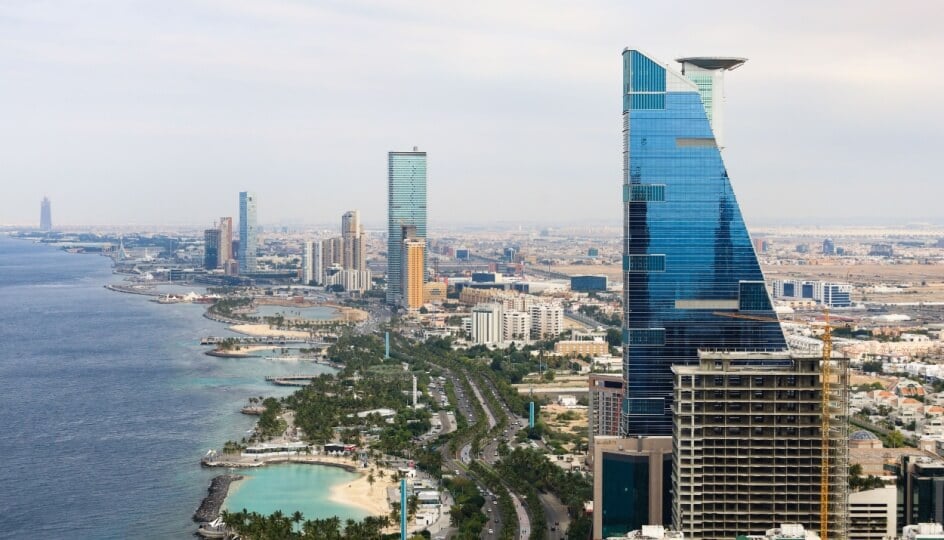Doing Business in the Kingdom of Saudi Arabia

The Kingdom of Saudi Arabia is both the largest country and economy in the Middle East and the third largest oil producer in the world.
With a rapidly growing economy and government-backed incentives to attract foreign investment, Saudi Arabia offers enormous potential for companies looking to expand into the Middle East.
About Saudi Arabia
Situated at the crossroads of Europe, Asia and Africa, the Kingdom of Saudi Arabia’s strategic location gives investors unrivalled access to a range of regional markets in the Middle East, North Africa and beyond.
Saudi Arabia defines itself as a sovereign Arab Islamic state and is ruled by an absolute monarchy, where the King and Crown Prince consult with a Council of Ministers on all political decisions under an authoritarian regime.
As the largest oil exporter in the world, the country’s economy been predominantly reliant on the oil and energy sector. However, in 2016, the government launched an initiative called Vision 2030, which aims to diversify the economy and attract increased foreign investment by reducing dependence on oil revenue. Great progress has been made on this front, as the expansion into other business sectors has significantly boosted economic growth. The economic landscape is changing as a result of investments in technology, tourism and renewable energy, guaranteeing a more robust and dynamic economy for future generations.
Large-scale infrastructure projects such as the developing urban area NEOM, the Red Sea Project and Riyadh Metro offer lucrative investments opportunities for construction and engineering businesses, while the country’s considerable investment in tourism – including the introduction of e-visas for international travellers - has seen an increase in both international visitors and local job opportunities.
Saudi Arabia is the only Arab country to be part of the Group of 20 (G20) countries that account for around 80% of the world’s GDP, and it is the largest member of the Organisation of the Petroleum Exporting Countries (OPEC). It is a member of the Gulf Cooperation Council (GCC) as well as a founding member of the United Nations (UN), Organisation of Islamic Cooperation and Arab League.
Fast Facts
- In 2023, the official estimate for Saudi Arabia's GDP was $1.807 trillion in purchasing power parity terms. (World Economics).
- Currency – Saudi Riyal (sign: ﷼ ; code: SAR).
- Language – Arabic.
- Type of government – monarchy based on Islam and headed by the King, who is also the commander in chief of the military. The King governs with the help of the Crown Prince and the Council of Ministers.
- Population – 37.33 million (Worldometer, March 2024).
- Country capital – Riyadh.
- Key sectors: oil, trade, investment.
With its favourable location, rich history and abundant resources, the Kingdom of Saudi Arabia is a very attractive market for investors. However, companies looking at doing business in Saudi Arabia should have an in-depth understanding of the business culture and the complex regulatory environment in order to succeed.
| TMF Group has recently acquired several divisions of Proven, a leading multinational outsourcing organisation that helps businesses operate fluidly in Saudi Arabia and other GCC jurisdictions. This acquisition allows us to provide services in Saudi Arabia through the inherited knowledge and customer base of a respected brand that is already operating successfully in the market. |
Advantages of doing business in Saudi Arabia
Saudi Arabia controls the world's second-largest oil reserves and sixth-largest gas reserves. While the appeal of the lucrative oil industry can’t be underestimated, in recent years the country has put significant effort into expanding its business opportunities for foreign investors in sectors such as tourism, entertainment, manufacturing, healthcare, education and technology.
Saudi Arabia is categorised as a World Bank high-income economy and is the world's 19th largest economy by nominal GDP. The business-friendly environment, optimal location and robust infrastructure are key advantages of doing business in Saudi Arabia. These factors make it the ideal destination for companies looking to set up regional headquarters (RHQ) in the Middle East and tap into the market’s vast potential.
As the largest economy in the GCC, the country serves as a gateway to a market of more than 60 million consumers and allows companies to capitalise on the GCC’s economic integration and free trade agreements.
KSA boasts a world-class infrastructure with heavy investment in ambitious projects in the transportation, logistics, telecommunications and utilities sectors, making it an excellent logistics hub for companies involved in supply chain management, distribution and warehousing. Flawless connectivity and multimodal transportation networks accommodate the seamless movement of goods and personnel while also providing efficient access to global markets.
A key advantage of doing business in the Kingdom of Saudi Arabia is the multitude of government-backed incentives and initiatives.
Vision 2030 aims to promote private sector growth through privatisation, regulatory simplification and economic diversification programmes that focus on four key elements: raising the quality of human capital, an improved business environment to attract foreign investment, top-quality public administration and an adaptable and competitive labour market.
Furthermore, the Kingdom's international standing has improved dramatically as a result of Vision 2030. As an active participant in regional and international politics, Saudi Arabia has developed a reputation for supporting alliances and programmes that advance prosperity, stability and peace. The country is establishing itself as a major player on the international scene by organising diplomatic initiatives and serving as the host of many international summits.
The Saudi government offers investment-led incentives such as tax exemptions, subsidies, land grants and expedited licensing procedures for overseas companies. Special Economic Zones (SEZs) such as King Abdullah Economic City (KAEC) and NEOM provide additional incentives and regulatory benefits for businesses that operate within these designated areas.
The benefits of doing business in Saudi Arabia are numerous, but companies will need to familiarise themselves with Saudi culture and the regulatory environment to reap the rewards.
Doing business in Saudi Arabia: the culture
The religion of Islam originally emerged in what is now Saudi Arabia, and it remains the country’s official religion under the Basic Law. Saudi culture is deeply rooted in Islamic principles and businesses must understand and demonstrate respect for religious customs and traditions. Saudi business etiquette can be described as conservative, but patently hospitable. Proper greetings and small talk to establish rapport are important, as is the emphasis on building long and trustworthy relationships.
Unlike in Western nations, where regulatory compliance and corporate governance form the indisputable foundation of business practices, Saudi Arabia mixes elements of its rich cultural heritage with business principles.
At the core of this approach is the cultivation of relationships and local partnerships. In order to be successful in business, it’s essential that companies take the time to form relationships that are based on trust and mutual respect. Leaders should get to know potential collaborators on a personal level, which in turn will pave the way for smooth business deals and long-term partnerships.
Saudis value indirect communication and diplomacy over pragmatism and directness. They prefer to establish a rapport with a potential partner before getting to the essence of business discussions. Negotiations happen at a slow and deliberate pace and rushing can be seen as a sign of disrespect. It’s essential for leaders to be patient and courteous and maintain decorum when negotiating or conducting business meetings.
The regulatory landscape in Saudi Arabia
Setting up a 100% foreign-owned entity in Saudi Arabia has gradually become easier as the government continues to implement regulatory reforms and create incentives aimed at attracting foreign investment.
In fact, KSA moved up from 92nd to 62nd in the most recent World Bank Ease of Doing Business report, a significant jump that is largely due to these reforms.
The country is aggressively seeking foreign investors to form limited liability companies (LLCs) to meet the objectives of Vision 2030, as evidenced by a decree issued by the Ministry of Investments of Saudi Arabia (MISA) in 2015 that overturned a previous law to allow foreign nationals to hold 100% foreign-owned entities in the retail and wholesale sectors.
However, despite some relaxed processes, it’s crucial that companies understand the complexities of the regulatory environment.
1. Types of companies and foreign ownership options
Investors doing business in Saudi Arabia will find there are several entity options for establishing a company.
LLCs, joint stock companies (JSCs) and branches are the most common types of entities in the country, with the branch office most frequently employed by multinational businesses.
There is no statutory minimum capital requirement to establish an LLC, however in practice, MISA often requires foreign LLCs to have a minimum capital contribution of SAR500,000. For certain business sectors including property investment, contracting and commercial, a minimum capital amount is specified.
Investors wishing to bid on fully or partly owned government contracts will need to establish a regional headquarters (RQH) within Saudi Arabia.
2. Labour laws
Understanding labour laws is crucial to stay compliant with Saudi employee requirements. One of the key challenges of doing business in Saudi Arabia is the strict government quota for hiring Saudi Arabian nationals.
The Vision 2030 programme has set a metric for increasing the number of local employees. This Saudi Nationalisation scheme is known as ‘Nitaqat’ and it aims to increase the employment rate of Saudi nationals in the private sector.
The percentage of Saudi nationals should be no less than 75% per company, unless special permission is received from the Saudi Arabian Ministry of Human Resources and Social Development (MHRSD). The MHRSD will grant permission in cases where companies can show a lack of Saudi workers with the relevant technical expertise or qualifications.
Saudi nationals can have either fixed-term or indefinite contracts, while expatriate employees may only be offered fixed-term contracts.
Foreign nationals require an employment visa to work in the country and, to obtain this visa, they must have a sponsoring employer in Saudi Arabia. The processing time for a work visa is approximately two to three months. Before contracting a foreign employee, companies must obtain approval the MHRSD in the form of a ‘block visa’ (or quota).
3. Sponsorship system (Kafala)
More than 50% of the workforce in Saudi Arabia consists of migrant workers. Here, as in many other GCC countries, immigrant labour is governed by the ‘kafala’ (sponsorship) system, a legal framework that defines the relationship between migrant workers and their employers relating to employment contracts, wages and working conditions.
Under this framework, KSA issues sponsorship permits to companies that allow them to employ foreign labourers. The system has historically been highly restrictive and subject to concern from human rights groups due to the lack of protection for employees.
In recent years, however, certain reforms have been implemented to increase protection for employees and allow for greater mobility. As of 2021, workers are allowed to leave the country or switch jobs without their employer’s permission once their contract expires. Additionally, they can switch jobs during their contracts provided they inform their employers within a specified timeframe.
Workers are also now exempt from “exit authorisation”, allowing them to travel indefinitely without their employer’s permission.
4. Tax system
Saudi Arabia operates on a territorial tax system, with corporate tax rates that vary depending on the industry and the number of Saudi employees in a company. Generally, non-Saudi investors are liable for corporate income tax in Saudi Arabia, as are non-resident corporates, both Saudi and non-Saudi, who carry out activities in the country.
The country has several tax regulations that make it attractive to investors, including no personal income tax, no standard tax year (businesses follow their own financial year) and user-friendly electronic processes through a single web portal with most elements available in English.
While the tax landscape appears simple, there are some challenges that businesses must be aware of. There is limited access to public information around tax requirements and companies can expect to find variations between tax codes and implementation. Tax appeals must be filed in Arabic and the application process for Double Taxation Treaty provisions is particularly hard to navigate.
The following is a list of taxes relevant for investors expanding into Saudi Arabia.
- Corporate income tax (CIT): a flat rate of 20% is applied to non-Saudi entities or permanent establishments, while the percentage for local owners (including GCC) is 2.5%.
- Withholding tax (WHT): ranges from 5% to 20% and may apply to non-resident entities on various types of income sourced from Saudi Arabia.
- Value-added tax (VAT): the standard rate is 15%, a significant increase from 5% that was implemented in 2020 to mitigate the economic impact of COVID-19. Certain good and services - including the international transportation of goods and passengers, some medicines and medical equipment, and the supply of investment metal - are exempt from VAT.
- Social insurance tax: all companies are required to pay a social insurance tax for each employee, with rates that vary for Saudi nationals and foreigners.
- Zakat: a form of Islamic tax that is collected from all Saudi entities.
The Zakat, Tax and Customs Authority (ZATCA) is the official tax authority and is responsible for the collection of all taxes and customs in Saudi Arabia.
Companies looking at doing business in Saudi Arabia should ensure they stay updated on tax regulations to ensure compliance and avoid unexpected liabilities.
In February 2024, Saudi Arabia published new tax incentives for RHQs of multinational companies that are established in the country. Under these tax rules, entities that meet the relevant criteria will be granted a 30-year renewable tax incentive of 0% CIT and 0% withholding tax (WHT). In addition, businesses may benefit from tax incentives available in certain regions.
Where to do business in Saudi Arabia
Multinational companies looking at doing business in Saudi Arabia must consider which city in which to set up a local entity.
When choosing the best location, companies should consider factors such as proximity to target markets, the availability of skilled labour and infrastructure connectivity. The key cities for business are Riyadh, Jeddah and Dammam.
Riyadh is the capital of Saudi Arabia and the centre of the country’s economic, finance and business operations. Freight forwarding companies in Riyadh operate daily, providing easy access to the rest of the country and abroad. Home to more than 6 million people, Riyadh is one of the fastest growing metropolises in the world.
Jeddah is the second most populous city after Riyadh and is home to the Red Sea’s largest port. The city has recently experienced a boom in tourism and is currently one of the fastest growing in terms of infrastructure and development, making it ideal for investors involved in urban expansion.
Dammam is the world’s richest oil area, making it an excellent location for companies in the oil industry. The city is also one of the best places for startups in the country, attracting entrepreneurs from many different sectors.
In addition to these cities, companies should also consider SEZs and industrial cities as options.
In April 2023, the Saudi government announced the launch of four SEZs with unique competitive and legislative advantages to attract international investors. The SEZs are: King Abdullah Economic City (KAEC), Jazan, Ras Al Khair and Cloud Computing in King Abdulaziz City for Science and Technology (KACT).
They offer incentives for international businesses operating from within the zones, ranging from 5% CIT rate for up to 20 years and 0% withholding tax to customs duties deferral for goods inside the zones.
Talent acquisition and human resources management
One of the most crucial components of doing business in Saudi Arabia is talent acquisition and human resources management.
In 2022, a census found that of Saudi Arabia’s then 32.3 million people, 42% were foreign nationals with 63% of Saudis under 30 years of age (General Authority for Statistics, 2022). With such a young population, the government’s plans to empower youth through education, training and job creation is especially pertinent for investors considering their options within Saudi Arabia’s workforce.
Vision 2030 entails a more comprehensive societal revolution in addition to economic reform. Modernisation is a key goal while still honouring cultural customs. Women's and youth empowerment initiatives have had a particularly significant impact. Vision 2030’s programmes are bringing Saudi Arabia's human capital up to its full potential through increased opportunities for women in the workforce, entrepreneurship programmes and educational reforms. With the addition of Saudi women to the workforce, the country boasts a growing pool of skilled professionals in a variety of industries such as finance, engineering, healthcare and technology.
Various employment reforms implemented since 2019 have allowed Saudi women to make unprecedented progress in joining the labour market. According to the World Bank Women Business and Law report, some of the reforms include a women’s right to choose a place of residency, the prohibition of employment discrimination based on gender and the dismissal of pregnant women.
In Saudi Arabia, effective human resource management is crucial for sustaining operations. Keeping abreast of policy developments, having a knowledgeable guide and establishing strong relationships with government entities are essential. Developing transparency, implementing best practices and aligning business strategies with financial and operational goals require local presence and robust government representation.
Companies expanding their presence in Saudi Arabia should be aware of the emphasis on recruiting locals. Using recruitment agencies and creating skills development initiatives are two ways investors can attract and secure top talent.
The regulations around expatriate talent acquisition are another consideration. Should companies need non-local employees with specialised skills, they will need to leverage international recruitment channels to find these employees as well as provide support for visa processing, relocation and cultural integration.
One of the key aspects of HR management for foreign companies doing business in Saudi Arabia is cross-cultural training. Non-local employees should have access to orientation programmes to help them adapt to the country’s work culture and social norms to minimise misunderstandings and promote effective collaboration.
With TMF Group's tailored services and extensive local expertise in Saudi Arabia, businesses can streamline their operations, ensure compliance, drive growth and leverage the promising opportunities presented by the Saudi market.
FAQs
1. What are the benefits of starting a business in Saudi Arabia?
The benefits of starting a business in Saudi Arabia include access to 60 million consumers in and around the Middle East, availability of capital, business-friendly infrastructure and tax incentives for foreign investors.
2. What types of companies can be incorporated in Saudi Arabia?
While there are many options for incorporating your company in Saudi Arabia, the most common entities are limited liability companies (LLCs), joint stock companies (JSCs) and branch office. Branch offices are used most frequently by foreign investors.
3. Are there any restrictions on foreign ownership of companies in Saudi Arabia?
Saudi Arabia generally allows 100% foreign ownership of companies provided the shareholders meet the criteria set out by the Ministry of Investments of Saudi Arabia (MISA).
4. How long does the company incorporation process take?
Companies looking to set up a branch or LLC in Saudi Arabia must obtain an investment licence from MISA before starting incorporation procedures. It takes approximately 3-4 months to obtain the commercial registration (CR) from the Ministry of Commerce and Industry
5. What is Saudization (Nitaqat)?
Saudization, or Nitaqat, refers to the Saudi Nationalisation Programme, an initiative by the Ministry of Labour that makes it mandatory for all companies operating in the country to hire Saudi nationals.
6. What is it like to do business in Saudi Arabia?
Doing business in Saudi Arabia is generally regarded as very lucrative, providing you have a thorough understanding of the culture and regulatory environment. The country’s fast-growing economy is supported by government incentives, a large amount of available capital and a wide range of developing industries.




